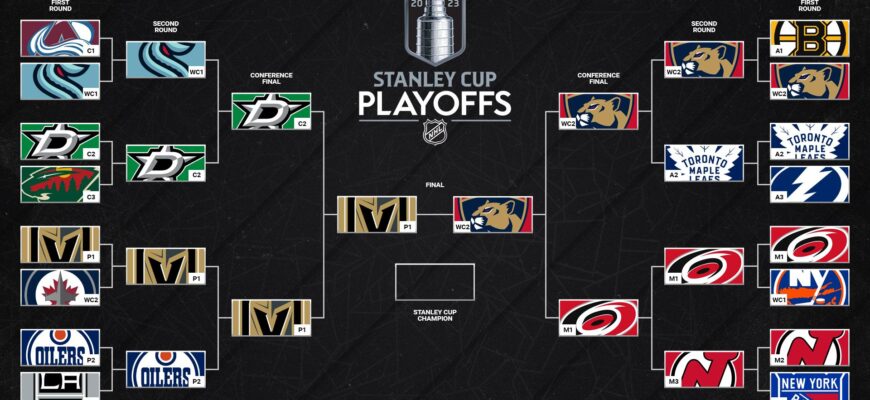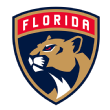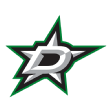The 2025 Stanley Cup playoffs are set to begin on Saturday after an exciting regular season in both conferences. Hockey fans are in for a treat with matchups like the Battle of Ontario, the Battle of Florida, the Mikko Rantanen Bowl, and another Kings-Oilers series in the first round.
The first round of the playoffs often provides the most thrilling series, as teams are generally healthier before injuries accumulate. This year`s first round is especially intriguing with genuine rivalries and high stakes right from the start.
While every team has a theoretical chance to win the Stanley Cup, not all are true contenders. Some teams look strong on paper but have a history of underperforming in the playoffs – Toronto and Winnipeg, for example.
The reality is that every team has a critical weakness, a flaw that could lead to their downfall. However, the team that best addresses their weakness and gets a bit of luck along the way is likely to be the one hoisting the Stanley Cup in June. Here`s a breakdown of the major weaknesses for the top 12 contenders.
- EASTERN CONFERENCE
- Washington Capitals Seed: Metro No. 1
- Toronto Maple Leafs Seed: Atlantic No. 1
- Tampa Bay Lightning Seed: Atlantic No. 2
- Carolina Hurricanes Seed: Metro No. 2
- Florida Panthers Seed: Atlantic No. 3
- WESTERN CONFERENCE
- Winnipeg Jets Seed: Central No. 1
- Vegas Golden Knights Seed: Pacific No. 1
- Dallas Stars Seed: Central No. 2
- Los Angeles Kings Seed: Pacific No. 2
- Colorado Avalanche Seed: Central No. 3
- Edmonton Oilers Seed: Pacific No. 3
- St. Louis Blues Seed: West wild card No. 2
EASTERN CONFERENCE
Washington Capitals
Seed: Metro No. 1
The Capitals surprised many by securing the top spot in the Eastern Conference, thanks to solid goaltending, strong performances from Dylan Strome, Pierre-Luc Dubois, and Jakob Chychrun, and breakthrough seasons from Aliaksei Protas and Connor McMichael, not to mention Alex Ovechkin`s record-breaking season.
The Capitals led the league in 5-on-5 shooting percentage this season, converting 10.69% of their shots. This high shooting percentage explains the increased offensive production from several players. Looking closer, the Capitals scored slightly more goals per game (2.71) than they allowed (2.50) at 5-on-5.
According to Sportlogiq, Washington`s success in the standings was largely due to their finishing ability and goaltending. Historically, these two factors are the most unpredictable in the playoffs. Neither Logan Thompson nor Charlie Lindgren has significant playoff experience. While their goaltending may be sufficient to advance in the first round, the Capitals` main weakness is that their shooting luck could run out at the worst time, and their goaltenders have shown inconsistency recently.
The Capitals are a decent team, but their underlying stats suggest they might not be strong enough to overcome a shooting slump in the later playoff rounds.
Toronto Maple Leafs
Seed: Atlantic No. 1
The Maple Leafs are considered contenders because they finished first in the Atlantic Division, not due to recent playoff success (or lack thereof). On paper, the Leafs have excellent goaltending, a solid defense, and a system better suited for playoff hockey. They won their division despite relatively quieter seasons from Auston Matthews and Morgan Rielly, focusing more on team defense.
However, regular season achievements mean little in the playoffs. The Leafs` persistent flaw for nearly a decade has been their mental hurdle. In several past seasons, the Leafs were favored in their first-round series, but their offense would disappear, their goaltending would falter, and their season would end prematurely.
Under coach Craig Berube, the Leafs play a more conservative style of hockey, emphasizing defense, tighter checking, and an offense focused on net-front play. But they must also overcome their internal struggles. Their best players are among the world`s elite. When these players perform at their peak, they are Toronto`s greatest strength. When they underperform, they become Toronto`s biggest weakness.
Tampa Bay Lightning
Seed: Atlantic No. 2
Every year, predictions suggest the Lightning will decline, but Jon Cooper`s team consistently proves doubters wrong. Despite Steven Stamkos`s departure, Tampa Bay enters the playoffs with another exceptional season from Nikita Kucherov (worthy of Hart Trophy consideration), excellent goaltending from Andrei Vasilevskiy, and strong contributions from Brayden Point, Brandon Hagel, and Victor Hedman.
The Lightning remain a high-quality team with a significant advantage: they know how to win in the playoffs.
Tampa Bay`s primary flaw is the potential for their luck to run out. They have the highest 5-on-5 goal differential above expected in the league, ranking fifth in goals scored above expected and fourth in goals saved above expected, and they have the highest PDO, indicating they`ve benefited from considerable puck luck.
Furthermore, Vasilevskiy has struggled in the past two playoff runs, with a save percentage below .900 in each series. The Lightning need Vasilevskiy to outperform Sergei Bobrovsky in the first round to defeat the defending Cup champions. Ultimately, the Lightning`s downfall might be the wear and tear on their aging core players.
Carolina Hurricanes
Seed: Metro No. 2
The Hurricanes have been a popular team to support in recent years, but their weakness has been the opposite of Tampa Bay`s regular season strength: inconsistent offensive production and shaky goaltending.
Their system emphasizes puck possession and control, rather than direct offense and high-danger scoring chances. Carolina is a well-structured team with forward depth and defensive quality, enhanced by the addition of Alexander Nikishin. The Hurricanes are a balanced team that plays with speed and generates scoring opportunities.
However, Carolina`s goaltending is their main concern this season, with only Frederik Andersen maintaining a save percentage above .900. Andersen and Pyotr Kochetkov will need to make enough saves to allow Carolina to win low-scoring games (2-1 or 3-2), as their shooting percentage and goal differential above expected are in the bottom half of the league. The Hurricanes don`t rely on luck, and while they are strong in secondary scoring, they need their goaltending to improve to avoid another early playoff exit.
Florida Panthers
Seed: Atlantic No. 3
The defending Stanley Cup champions finishing third in their division highlights the competitiveness of the Atlantic. Tampa Bay, Toronto, and Florida all have strong arguments to be Cup finalists.
The Panthers` biggest challenge is their inconsistent lineup. Florida was plagued by injuries to key players late in the season. While these players are expected to return for the playoffs, their full health is uncertain.
Florida needs Aleksander Barkov to compete with top players from other teams in the division, and they need Matthew Tkachuk for his scoring and physical presence. While the roster has toughness with players like Sam Bennett and Brad Marchand, the question is whether the Panthers can maintain discipline. Also, Aaron Ekblad`s performance after returning from suspension is a question mark.
Playoffs are about momentum and rhythm, and the significant time missed by key players could disrupt team chemistry. Despite these issues, being relatively healthy heading into the playoffs is a good problem to have. When fully healthy and performing at their best, Florida is arguably the strongest team in the East with no obvious weaknesses. If the Panthers can regain their form and stay healthy, they could be playing for the Cup for the third consecutive year.
WESTERN CONFERENCE
Winnipeg Jets
Seed: Central No. 1
The Jets winning the Presidents` Trophy is a potential concern due to the “Presidents` Trophy Curse.” However, their main flaw is different.
Winnipeg`s biggest issue remains their Vezina Trophy-winning goaltender in the playoffs. Connor Hellebuyck is likely to win his second consecutive Vezina, but the NHLPA poll didn`t rank him as the league`s top goalie. Players ranked Vasilevskiy and Shesterkin higher, likely due to their playoff track records.
Hellebuyck has only two playoff wins in the last two seasons, with a save percentage of .874 and allowing nearly 10 more goals than expected. While he`s not solely responsible for Winnipeg`s consecutive first-round exits, he has been a significant factor. When Hellebuyck is at his best, he`s almost unbeatable. However, his peak performance tends to be in the regular season, not the playoffs.
The Jets have several players who have had career-best seasons, such as Mark Scheifele and Kyle Connor offensively, and Josh Morrissey on defense. Combined with Hellebuyck, the Jets should be Cup contenders. To reach the Western Conference finals, two things must happen: Hellebuyck needs to play at his Vezina-winning level, and their depth needs to match up against teams with stronger center depth.
Vegas Golden Knights
Seed: Pacific No. 1
The Golden Knights are leading the Pacific Division, and for the first time in years, there`s no controversy surrounding long-term injured reserve usage.
Jack Eichel has been outstanding for Vegas this season, even in Hart Trophy consideration and potentially a Lady Byng nominee. Beyond Eichel, the Golden Knights get key offense from Tomas Hertl, Mark Stone, Pavel Dorofeyev, and Ivan Barbashev. They are one of the deepest teams in the NHL at forward and defense.
Aside from staying healthy, which has been a challenge for Vegas, their main weakness is penalty killing. Minnesota will be a tough opponent for Vegas with a healthy Kirill Kaprizov and Joel Eriksson Ek, plus Brock Faber and the newly signed Zeev Buium. The Golden Knights rank 26th in penalty kill this season, with only the Wild and Blues below them among playoff teams.
Improving their penalty kill is crucial for the Golden Knights. If they get past Minnesota, they will face teams in the West with elite power-play talent (McDavid, Draisaitl, Makar, MacKinnon, Scheifele, Connor, etc.) which could be decisive in a series.
Dallas Stars
Seed: Central No. 2
The Stars are an exciting team, but they have the most obvious weakness among contenders. The injury to Miro Heiskanen creates a significant void and makes Colorado the series favorite.
With Heiskanen, the Stars boast two Norris Trophy-caliber defensemen, including Thomas Harley. Without him, managing Colorado`s depth will be difficult.
Their forward depth is among the league`s best, but Heiskanen`s absence could be their undoing in the first round. If Heiskanen returns at any point, Dallas instantly becomes a top contender in the West. Heiskanen is a game-changer, and Dallas needs him to make a deep playoff run. Unfortunately for the Stars, this weakness is not easily fixable and beyond their control.
Los Angeles Kings
Seed: Pacific No. 2
The Kings are a well-rounded team with strong goaltending and balanced offense. Anze Kopitar remains a top two-way center, and the Kings don`t rely on individual point-per-game players. With balanced scoring and defensive depth, the Kings are 17-4 with a +41 goal differential and a 56.2% expected goal percentage since the trade deadline. They have been one of the NHL`s best teams recently and are peaking at the right time.
Their main weakness is the power play. Power-play chances are limited in the playoffs, and the Kings need to convert more than 15% of their opportunities for playoff success. Their 5-on-5 play is among the best in the NHL, allowing them to control games. Facing teams with strong power plays in the West, the Kings must improve their power play to avoid another first-round exit.
Colorado Avalanche
Seed: Central No. 3
Despite finishing third in the Central, many consider the Avalanche the best team in the West. Nathan MacKinnon and Cale Makar are having Hart Trophy-caliber seasons. The addition of Mackenzie Blackwood has stabilized their goaltending, allowing Colorado to confidently compete with the Stars (Oettinger) and Jets (Hellebuyck).
Brock Nelson and Charlie Coyle have been valuable additions, giving Colorado excellent center depth. More importantly, Gabriel Landeskog is expected to return after a three-year absence, boosting both the lineup and team morale.
On paper, the Avs appear to have no major flaws, which is surprising considering they traded Mikko Rantanen earlier this season (and will face him in the first round).
The potential issue for the Avs could be Dallas Stars coach Peter DeBoer. The Avs struggled to score against Dallas in last year`s playoffs, and DeBoer has a history of defeating the Avs in the playoffs with three different teams. He knows how to strategize against them, and coaching could be a deciding factor. Jared Bednar is an excellent coach, but if the Avs have a weakness beyond Blackwood`s lack of playoff experience, it might be being outcoached by DeBoer.
Edmonton Oilers
Seed: Pacific No. 3
Coming off a Game 7 Stanley Cup Final loss, the Oilers are in a more vulnerable position this year. Already lacking defensive depth, they are likely underdogs against the Kings due to their primary flaw: lack of overall depth.
Mattias Ekholm`s injury is a significant blow for the Oilers, similar to the Stars losing Heiskanen. While Ekholm isn`t Heiskanen`s equal, he is irreplaceable on the Oilers` blue line.
Injuries to Connor McDavid and Leon Draisaitl late in the season highlighted that without both players performing at an elite level, the Oilers struggle. Their lack of depth was further exposed by the offseason departures of Dylan Holloway and Philip Broberg, and has been a recurring issue. Ryan Nugent-Hopkins and Zach Hyman have regressed from their exceptional 2023-24 seasons, and the Oilers` goaltending has been inconsistent.
Many factors could derail the Oilers, all stemming from their lack of depth at every position. Their goaltenders must perform well, and their superstars must play at their absolute best, because the rest of the roster doesn`t resemble a true contender.
St. Louis Blues
Seed: West wild card No. 2
The Blues are included here not because they are top Stanley Cup contenders like the others, but because they have a history of playoff surprises.
Play `Gloria,` anyone?
Since hiring Jim Montgomery on Nov. 24, the Blues have been excellent. They achieved a franchise-record 12-game winning streak, dramatically improving their playoff chances from 3.5% to qualification.
The franchise has a history of making in-season coaching changes leading to deep playoff runs. Craig Berube took over the Blues in January 2019, and they went on a magical run, fueled by Jordan Binnington`s strong goaltending, to win the Stanley Cup. Is a repeat likely? No. Could the Blues upset the Jets? Yes.
St. Louis is this year`s Cinderella team in the playoffs. Their weaknesses are numerous, making a long run improbable. However, the Blues are riding a wave of confidence, which can be valuable in the playoffs.






















